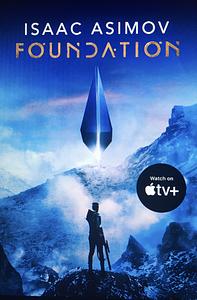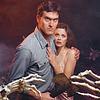Take a photo of a barcode or cover
It is interesting to see where some sci-fi tropes originated, but this book is a bit hard to push through and the characters are far from memorable.
The grand scale of the world-building, and the intriguing and varied cast of characters were awfully compelling. I love the ideas of psychohistory, technology as religion, and mathematically modeled destiny. The pacing, overall, is excellent too. Just the right amount of detail, while not hesitating to leap through time, or gloss over mundane details. The Traders got a bit boring, but was promptly justified and explained in The Merchant Princes. Mallow and his storyline were probably my favorites. He reminds me of Seldon or Hardin, which I mean as a great compliment.
Ultimately, boring. The skeleton of a story is here with concepts that are interesting but theres a ton of expositional conversation, which was the trend for sci-fi at the time, and all the telling really gets in the way of making the emotionality of the story viable
My ebook check out expired but also I just wasn't that into it
Not only a compelling story, Foundation is also a treatise on the implementation of political soft power, in the same way that “The Moon is a Harsh Mistress “ was a treatise on anarchism.
At this point, I don't think we really need to say much about Isaac Asimov's seminal work. The Foundation series of books is classic science fiction at its finest. It was written in a time when science fiction was relegated to pulp magazines, when the only plot lines that mattered were that of men flying into space via rocket ships to save a damsel in distress from green, tentacled aliens. Asimov came in with the first Foundation book and said, guys, science fiction can be so much more. Science fiction can be used to examine the entire human condition.
What I like about this book is that, yes, it does examine all of that, but Asimov wraps it up in a nice, little package that usually involves some kind of mystery or politicking that keeps the plot going. Foundation also frankly features some of Asimov's best writing that I haven't seen anywhere else before.
With that said, Foundation is not without its flaws. I think each section of the book has a central thesis that Asimov wants to convey, but it's sometimes boggled down by the plot or the lyrical yet somewhat opaque writing style that he was gunning for at the time. Unlike I, Robot, his other favourite book of mine, The Central thesis here are sometimes hard to grasp. I don't need things to be spelt out for me, but sometimes it helps when the text isn't written in Russian.
Overall, I'm glad I took the time to re-read this classic (also because I was in a real reading slump and needed a pick-me-up). I read Foundation at a time when I couldn't fully grasp the potential of the genre. A lot of the concepts slipped by me at the time, and I am happy to say that I got more out of this re-read than my first time through. Highly recommended for anybody who's more into cerebral science fiction.
What I like about this book is that, yes, it does examine all of that, but Asimov wraps it up in a nice, little package that usually involves some kind of mystery or politicking that keeps the plot going. Foundation also frankly features some of Asimov's best writing that I haven't seen anywhere else before.
With that said, Foundation is not without its flaws. I think each section of the book has a central thesis that Asimov wants to convey, but it's sometimes boggled down by the plot or the lyrical yet somewhat opaque writing style that he was gunning for at the time. Unlike I, Robot, his other favourite book of mine, The Central thesis here are sometimes hard to grasp. I don't need things to be spelt out for me, but sometimes it helps when the text isn't written in Russian.
Overall, I'm glad I took the time to re-read this classic (also because I was in a real reading slump and needed a pick-me-up). I read Foundation at a time when I couldn't fully grasp the potential of the genre. A lot of the concepts slipped by me at the time, and I am happy to say that I got more out of this re-read than my first time through. Highly recommended for anybody who's more into cerebral science fiction.
This is really disappointing because the first part of this book was absolutely amazing and I was really really intrigued. I also loved reading it right before bed in Lee Pace's voice it was very soothing and made me look forward to reading it but ultimately the story was just not holding my attention and someone else wanted to borrow it at the library. Special thanks to my respiratory doctor from a couple years ago recommending this book.
3.5 stars. Interesting story but some of the details go way over my head especially if I'm tired.
fast-paced
The Foundation trilogy was selected for this year's Science Fiction for Book Club. Having read iRobot recently, I roughly knew what kind of storytelling I was getting into. Foundation #1 focused heavily on dialogue between two people either asking for assistance or arguing against each other (which is hilarious at times). There were few parts where action happened, but you knew it happened because the characters recalled events or spoke their plans aloud. What I really enjoyed about this story is the unravelling of Hari Seldon's set plan for the future of an Empire. He is the all-knowing character in the story who helps the uninformed future of people after his death. The Empire goes through different stages. At the end of Foundation #1, the story is in between stages. I am embarking onto Foundation & Empire #2 with curiosity.





